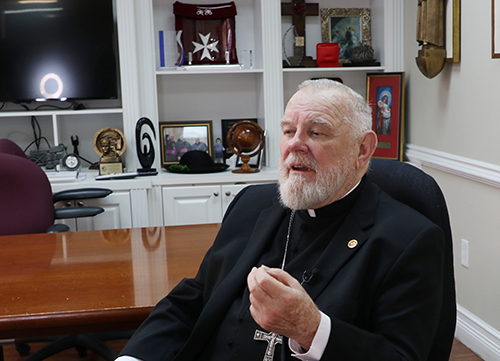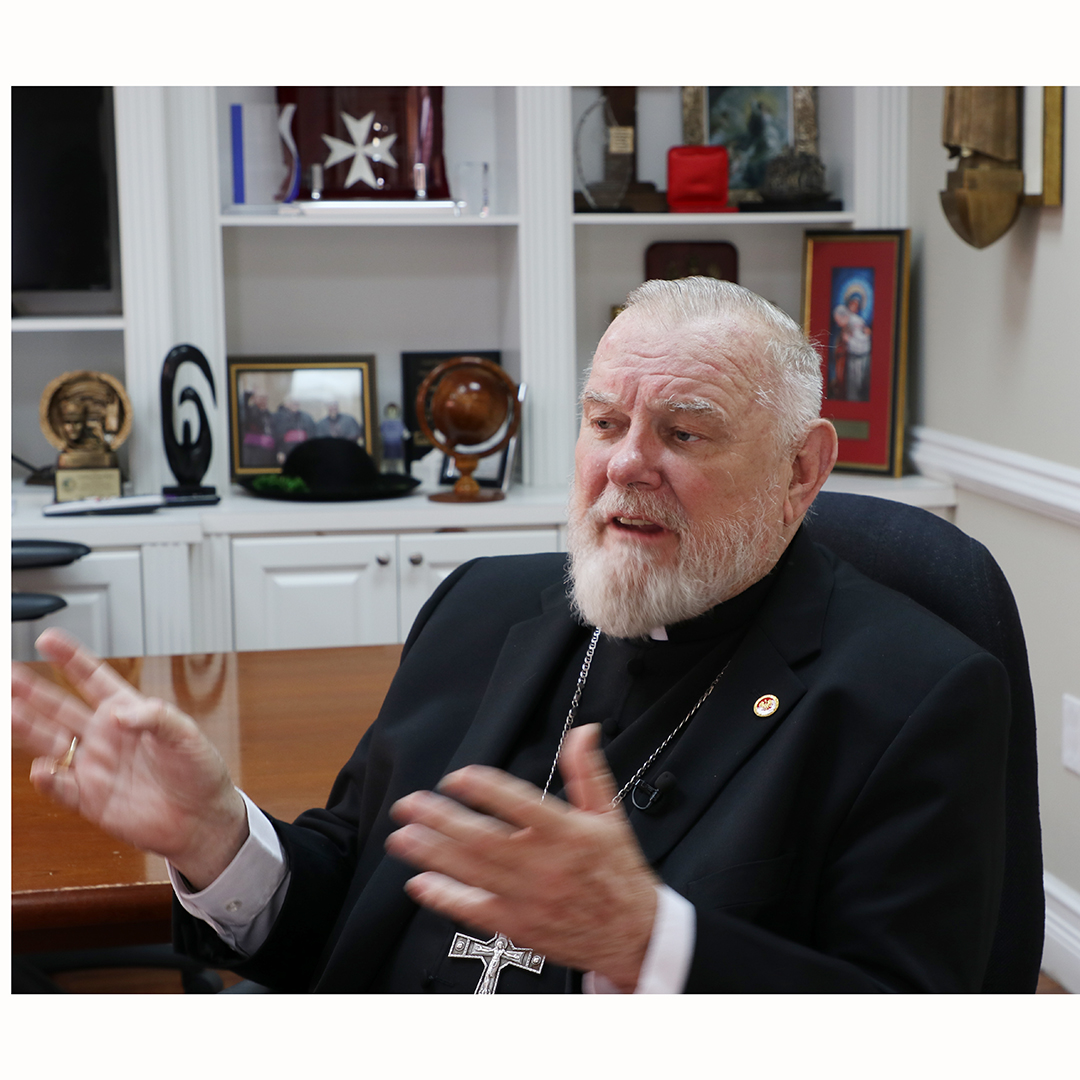By Rocio Granados - La Voz Catolica
MIAMI | Current immigration policies do not uphold due process. "It's time for Congress to do something," Archbishop Thomas Wenski said during an interview on July 11, 2025 at the Pastoral Center in Miami Shores.
"I would like Congress to step up and take responsibility for making laws. We don't like judges legislating from the bench, but neither should the executive branch legislate with executive orders. Congress should make the laws, the executive branch should enforce them, and the judiciary should act as referee to ensure that the laws are consistent with our constitutional principles," the archbishop emphasized.
He explained that our current immigration system is broken and needs to be fixed because it is harming people, destroying families, and dividing communities.
The current administration may claim it is simply enforcing the laws, but "if that is the case, the laws must be changed—and that is the responsibility of Congress. Congress can rewrite, adjust, or fix the law," said the Archbishop. He added that Congress must introduce legislation to create a legal pathway for people without criminal records to remain in the country.

Photographer: ROCIO GRANADOS | LVC
Archbishop Thomas Wenski speaks on current immigration policies and Alligator Alcatraz, the new detention center in the Florida Everglades July 11, 2025 at the Pastoral Center in Miami.
The archbishop acknowledged that it is understandable for the government to detain individuals who have committed serious crimes, as no one wants criminals walking free on the streets. "But the vast majority of those here without permanent status are honest, hardworking people who simply want a future of hope for their children and their families," he said.
A few days earlier, on July 3, in a statement on immigration enforcement, the archbishop said it is alarming to see all undocumented immigrants being treated as dangerous criminals. He also expressed surprise that masked and heavily armed agents fail to identify themselves during law enforcement operations. Additionally, he pointed to the apparent lack of due process in deportation proceedings in recent months.
"There have always been deportations, and most of the time with due process. But there is a lot of attention on these deportations right now," Archbishop Wenski said.
He noted, "We all want to make America great again, but you're not going to make America great by making America mean."
He explained that the current immigration policy is broken and, unfortunately, it is breaking the lives of people who have been working hard for years. Many of them are in the country legally or with a quasi-legal status—beneficiaries of Temporary Protected Status (TPS), humanitarian visas, or individuals who have applied for asylum or been granted parole and hold valid work permits. If their legal protections are taken away, they will become newly unauthorized—or undocumented—immigrants, and subject to deportation.
Many people have had TPS for decades. Hondurans received it following Hurricane Mitch in 1998, and Haitians obtained it after the 2010 earthquake.
Unfortunately, TPS, established by Congress in the early 1990s, did not anticipate what would happen if conditions in these countries failed to improve significantly, preventing people from returning home safely.
Currently, people with TPS and other protections against deportation, such as "Dreamers," live in permanent limbo. Now, the Trump administration plans to begin deporting them, disregarding the contributions they have made and continue to make to American society.
"What makes it cruel right now is the arbitrariness of this push to deport people who have already made a stake here—people who have put in sweat and effort to stay. If the United States government has allowed them to remain for 10 or 20 years, you can imagine many have children who are American citizens, own homes, or have established businesses," Archbishop Wenski noted. "To simply tell them to 'go back home'—when there is no home back there, and their home is here—that's what makes it cruel."
Alligator Alcatraz
Regarding the new detention center inaugurated by President Donald Trump on July 1—located at the former Dade Collier Training and Transition Airport and operated by Miami-Dade Aviation in the Florida Everglades—the archbishop said, "We have a detention center in the middle of the jungle, surrounded by snakes, alligators, mosquitoes, and more. It is an inhumane situation."
He noted, "It is insulting that those who should know better are mocking the misery of their brothers and sisters. We are all brothers and sisters, and no one should ridicule the suffering of other people. Even the name 'Alligator Alcatraz' is a cruel mockery of the pain those people endure."
The Archbishop reported that, through the Archdiocesan Prison Ministry, "from the moment this detention center opened, the Archdiocese has requested access to provide religious services," just as it does at other facilities, such as Krome in Miami.
"Every time we ask, we're told, 'That belongs to the feds.' Others say, 'No, it's state property.' "Apparently, no one wants to accept responsibility for managing that detention center," the archbishop added.
He shared that Deacon Edgardo Farías, director of the Archdiocesan Prison Ministry, visited the site to inquire about when they could celebrate Mass, but was told the mosquito situation was very bad and to come back later.
The conditions are far from comfortable. "And no matter how securely tents are set up, a strong windstorm would, I think, make them hazardous. Plus, the Everglades out there is very, very hot," he said.
Father Elvis Gonzalez, pastor of St. Michael the Archangel Church in Miami, ministers twice a month at a federal immigration detention center in Miami, where he celebrates Mass and visits inmates. He noted a rapid increase in detainees, which accelerated the construction of the new center in the Everglades.
"It is heartbreaking to see hard-working people paying the price for the crimes of others, and now anyone can be targeted, even those in the process of seeking asylum," said Father Gonzalez.
"I remember that the last time I visited the detention center during the Easter season, about a month ago, some of the men approached me to say they would not be home for their children's First Communion or Confirmation. They are waiting to see the judge to decide their fate," said the priest.
To those with a family member who was suddenly deported or detained at Alligator Alcatraz, the archbishop said, "Many times, you cannot take away someone's cross, but you can help carry it, just as Simon of Cyrene did."
He urged archdiocesan priests to "accompany their people to ease their distress. Some are afraid to attend Mass, but I don't believe authorities will enter churches during Mass to remove people. It's more dangerous to go to the market than to go to Mass."
Freelance reporter Tom Tracy contributed to this article.


Comments from readers